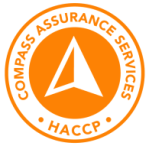
Food Safety Certification for Your Business
Hazard Analysis and Critical Control Points
Hazard Analysis and Critical Control Points, commonly referred to as HACCP, is a science-based systematic approach to identify and manage hazards, ensuring the safety of your products. HACCP isn’t limited to businesses that manufacture or handle food; it can be achieved by any business working with or near food-related products, such as transportation companies, pest controllers, and manufacturers of food packaging.
HACCP is a globally recognised food safety certification and involves creating a Food Safety Management plan or Food Safety Management plan. This plan identifies potential hazards that could impact the integrity of your products and outlines the procedures to prevent or reduce these hazards. By focusing on prevention rather than end-product testing, HACCP ensures the safety of food products by controlling biological, chemical, and physical hazards, thereby protecting consumers and enhancing business credibility.
The potential benefits of achieving a HACCP certification go Beyond meeting client needs. HACCP ensures safe food production by systematically identifying and controlling potential hazards, which protects your consumers and builds trust in your brand. Another key benefit is improved market access, as many clients demand suppliers meet rigorous food safety standards. Certification demonstrates your commitment to quality and safety, enabling access to new markets and enhancing market reputation. Moreover, HACCP enhances operational efficiency by minimising risks, reducing errors, and cutting costs through better resource management. It also fosters a culture of safety among employees, ensuring they are well-trained and engaged in maintaining high standards, contributing to a safer and more efficient workplace.
Need a Quick Quote?
Request an obligation free quote today, tailored specifically to your business’ certification needs and industry.
Get Your Free ISO Checklist
Training Sessions
Contact Us

What is HACCP Food Safety Certification?
HACCP is a tool that focuses on prevention rather than relying on end-product testing. HACCP can be applied through the food chain from primary production to final consumption and its implementation is guided by scientific evidence of risks to human health.

Why do I need HACCP Food Certification?
This capability is reviewed by an independent third party prior to any certifications being issued. This is where the value in the HACCP certification lies. Consumers and customers can take assurance that the processes in place meet the requirements of established best practice.

What are the benefits of getting HACCP certified?
This is where the value in the HACCP certification lies. Consumers and customers can take assurance that the processes in place meet the requirements of established best practice.

How can I get certified?
Getting a HACCP certification / accreditation is a lot easier than you might think, We take you through the easy audit process from your initial enquiry to the final certification decision.

HACCP Certification Throughout Australia
Compass Assurance Services have offices and certification staff located throughout Australia including Brisbane, Melbourne, Perth, Adelaide, and Sydney.
Have you looked at our self assessment checklist yet?
We worked hard so you don’t have to. Our checklists break down the certification standard in plain English so you can understand the requirements and what your business needs to do to get certified.


Come along to one of our Workshops
The HACCP Essentials course is designed to provide a basic and contextualised introduction to the HACCP principles and key food safety practices. Emphasis is placed on practical application by considering how a HACCP certification may apply to your business.
LEARN MORE
7 Key Principles of HACCP Food Safety Certification
Hazard Analysis (HA) – HACCP Certification Principle 1
Conduct a hazard analysis
The HA is used to identify potential microbiological, physical, chemical and allergen hazards that may be reasonably expected to occur at each process step. Allergen cross contamination risk is also included. Regulatory / legal and quality hazards and issues at each step shall also be considered.
The HA includes:
- The likely occurrence of hazards and severity / consequence of their adverse health effects or effect on product quality or regulatory compliance
- Qualitative and/or quantitative evaluation of the presence of hazards
- Survival or multiplication of micro-organisms
- Production, persistence or cross contamination of toxins, chemicals or physical agents
Determination of CCPs – HACCP Certification Principle 2
All hazards at each process step identified during the HA shall be considered in sequence and categorised giving a Risk Rating. If there are hazards at particular steps that are deemed as significant, then it needs to be determined if the step is a Critical Control Points (CCP), Quality Control Points (QCP) or Regulatory Control Points (RCP). Steps that are not a CCP / QCP or RCP but still need to be controlled are control points (CP) and are to be controlled through the established Food Safety & Quality Program.
CCP Critical Limits – HACCP Certification Principle 3
Establish the Critical Control Points (CCP’s)
Critical Limits separate acceptability from unacceptability. CCPs are based on:
- Established food safety principles or published research
- Legislative requirements
CCPs shall be measurable/quantitative. Where possible, Action Limits shall be set that allow sufficient time for corrective actions to be taken before CCP critical limits are breached. The accuracy / precision / tolerance of monitoring equipment shall be taken into account when setting critical limits and action limits.
CCP Monitoring – HACCP Certification Principle 4
Establish a system to monitor control of the CCP.
Monitoring procedures are the planned sequence of observations or measurements of CCP control measures. Monitoring systems shall be able to detect loss of control at the CCP, and shall provide this information in time for corrective action to be taken to regain control of the process, and to identify, segregate and reject product before it is dispatched.
The documented monitoring system for each CCP shall define:
- Responsibility – job title of the individual who will carry out the monitoring
- Frequency – if not continuous then at a frequency sufficient to ensure that the CCP is under control.
- Method – detailed specification or procedure
- Records to be kept – include action limits and critical limits, result of monitoring activity, signature of responsible person and verification countersignature.
Corrective Actions – HACCP Certification Principle 5
Establish the corrective action to be taken when monitoring indicates that a particular CCP is not under control.
As with any control process corrective actions need to be taken when monitoring indicates a trend towards loss of control (action limits breached) or a breach of CCP critical limits. The corrective actions will differ slightly depending on which limit is breached:
Where Action limits are breached corrective actions should include:
- Immediate action to re-establish control before the deviation leads to a CCP breach
- Responsibility for the corrective action
Where Critical limits are breached corrective actions should include:
- Immediate action to re-establish control
- Identification of all product produced since critical limit was breached (since last in control monitoring result)
- Disposition of affected product
- Responsibility for the corrective action

HACCP Plan Verification – HACCP Certification Principle 6
Establish procedures for verification to confirm that the HACCP system is working effectively.
As corrective actions are implemented it is important that they are verified to ensure they are achieving the desired results. Verification to confirm the HACCP system is working effectively shall include:
- Microbiological and chemical testing (where applicable) to confirm CCPs, QCPs and RCPs are in control. The schedule includes the type and frequency of testing which has been determined by the risk nature of the products and processes, and covers all finished products.
- Shelf-life validations covering both microbiological and sensory testing (where applicable). The schedule includes the type and frequency of testing.
- Physical assessments of products against specifications. Methods for assessment, responsibilities and frequency of assessment are defined.
- Reviewing internal incidents, non-conforming product records, customer complaints, withdrawals or recalls relating to food safety, quality or legality.
- Internal audits of CCP monitoring and corrective action records
Documentation & Record Keeping – HACCP Certification Principle 7
Establish documentation concerning all procedures and records appropriate to these principles and their application.
It is important to be able to demonstrate that the principles of the HACCP certification have been correctly applied and this is done through documentation and record keeping. These records should include:
- The HACCP Plan, Objectives, Scope, Regulatory & Customer Requirements
- HACCP Development Team Meeting Minutes
- Finished Product Descriptions
- Process Flow Diagrams
- Hazard Analysis
- CCP Determination and Validation
- Critical Limit / Action Limit Determination
- CCP Monitoring Procedures and Corrective Action Procedures
Documentation should also exist to demonstrate that the HACCP Plan has been effectively managed and implemented. This should include:
CCP Monitoring Records
- Corrective Action Records
- HACCP Training records and competency assessments for operators, supervisors and managers
- Evidence of HACCP management including:
- Verification Schedule and Records
- Team Meeting Minutes
- Modification records
12 Steps for the application of HACCP
In order to implement HACCP there are 12 steps that should be followed:
- Assemble a HACCP team – made up of those people with the required knowledge and expertise for the development of an effective HACCP plan (which may include outside resources). It is important that this team has undergone the appropriate HACCP training.
- Describe the product – this should include the compositions, physical/chemical structure, treatments, and packaging, durability and storage conditions of the product.
- Identify intended use – the expected uses of the product by the end user or consumer.
- Construct flow diagrams – should cover or the specific steps in the operation for a specific product including the steps preceding and following the specified operation.
- On-site confirmation of flow diagrams – this is to be done by a person with sufficient knowledge of the processing operation.
- List all potential Hazards, Conduct a Hazard analysis and consider control measures (Principle 1)
- Determine CCP’s (Principle 2)
- Establish critical limits for each CCP (Principle 3)
- Establish a Monitoring system for each CCP (Principle 4)
- Establish Corrective actions (Principle 5)
- Establish verification procedures (Principle 6)
- Establish documentation and record keeping (Principle 7)
Want to speak to someone?
Contact Us
Contact us and speak to one of our helpful team about your ISO certification needs. We can offer certification to smaller, niche standards and to other non-accredited (non ISO) standards as well.
Request a Quote
Request an obligation free quote today, tailored specifically to your business’ certification needs and industry.

